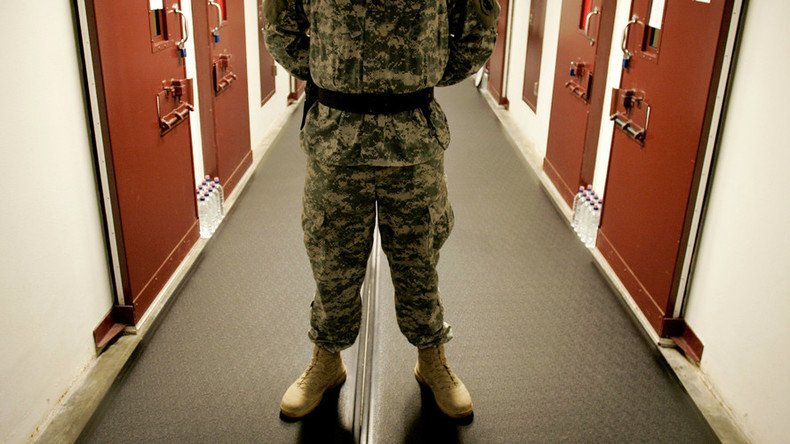‘I just do my job’: Gitmo guards show RT around the indefinite detention camp (VIDEO)

The new RT special GTMO 2016 offers a kaleidoscope view of the Guantanamo Bay military prison with conversations with guards, detainees’ lawyers, excerpts from a detainee’s daily dairy and the activists fighting for justice and their release.
“I can’t speak about what went on with them prior to coming here,” a non-commissioned military police officer at maximum security Camp 5 told RT’s Simone Del Rosario. The officer’s identity was withheld and his face is obscured from view in the special, which that takes viewers inside the military prison’s Camp 6 as well as the entrance to Camp 5.
Camp 6
Camp 6 is where men are being held waiting for release. These are men detained for years, not charged with any crime. There are also others who are yet to be reviewed for possible transfer years after being detained.
They live in a communal setting with single cells measuring 95 square feet with access to showers, a media room and a library, according to the guards who describe the men as the most compliant. Additionally, they can watch television, read, and, guided by military-painted directions, pray towards Mecca.
Detained without due process, they are, to a degree, self-governed. The Camp 6 prisoners select a block leader to negotiate with their guards.
Camp 5
Camp 5 is the maximum security area where RT cameras were not allowed the film. A military police officer assured Del Rosario that the detainees there are just like regular human beings with normal feelings, while also noting the day-to-day operational hazards.
When asked how he handled questions from detainees about why they were detained, he said it was about parameters.
“It is a high level operation that says whether they stay here or transition or transfer to somewhere else,” the non-commissioned officer said. “That’s the posture we take, and the mission we carry out. I just do my job.”
He added, “What I tell my guard force is we have a mission, we have a directive, that’s where our mindset needs to be, our focus needs to be. If we start thinking outside those parameters, that’s when you start making mistakes.”
“The easiest thing to do, and it’s our moniker, is just do your job.”
Indefinite detention
President Obama, before actually winning the title, promised that he would close the infamous Guantanamo Bay detention camp in Cuba. That campaign commitment has yet to be fulfilled, as the US move towards electing a new president.
Obama’s plan to close Guantanamo names no locations to replace Cuba-based prison – reporthttps://t.co/PnwOyUFK7Ypic.twitter.com/PZgQqWuNU1
— RT America (@RT_America) February 23, 2016
Many detainees have been released, but of the 80 remaining are 30 tacitly approved for release without actually being let go. They are waiting for other countries to accept them, and in many cases, the men are Yemenis who the US refuses to send back home due to the ongoing war there involving US-backed Saudi bombings.
Thirty-one men are still waiting for a hearing or the result of a periodic board review approving their status to be released. Then there are nine men considered too dangerous for release, though the US government has no evidence against them.
The final 10 others have been charged in a war court. among them Khalid Sheik Muhammad, the alleged mastermind of the September 11, 2001 terrorist attacks.
Obama threatens veto of NDAA over Guantanamo, US-Cuba relationshttps://t.co/Wq06ucMHvPpic.twitter.com/EBBsGMXfJ6
— RT America (@RT_America) June 9, 2016
Of the roughly 779 men that have been detained at Gitmo in its 14 years of operation, nine have died.
RT’s Del Rosario also talked to attorney Nancy Hollander who represents Mohamedou Ould Slahi, a Mauritanian who had volunteered decades ago to join the Mujahideen, who were backed by the US government, in their fight against the communist Afghanistan government.
Slahi has been detained since 2002 and tortured, including suffering isolation and sexual humiliation. He wrote about his experiences in the Guantanamo Diary, which has 2,500 redactions but was published in January 2015. Ironically, Slahi is not allowed a copy.
On June 2, he received his periodic review hearing.
Other interviews include former Gitmo guard Joseph Hickman, who said he witnessed three deaths and gave accounts of repeated beatings, often provoked by guards. There is also British journalist and activist Andy Worthington, who has fought for many years to expose the atrocities and crimes at Guantanamo. He repeatedly calls for the release of the men.











